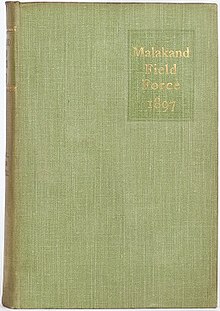This article needs additional citations for verification .(July 2008) |
 First edition | |
| Author | Winston Churchill |
|---|---|
| Language | English |
| Publisher | Longman |
Publication date | 1898 |
| Publication place | Great Britain |
| Pages | 268 |
| ISBN | 978-0-486-47474-8 |
| OCLC | 319491196 |
| 954.91/20355 | |
| LC Class | DS392.N67 C48 2010 |
The Story of the Malakand Field Force: An Episode of Frontier War was an 1898 book written by Winston Churchill; it was his first published work of non-fiction. [1]
Contents
The book describes a military campaign by the British army in what would shortly after become the North-West Frontier Province (now western Pakistan and eastern Afghanistan) in 1897. It is dedicated to General Bindon Blood.
The story of the campaign and Churchill's part in it is told in Churchill's First War: Young Winston and the Fight Against the Taliban (2013) by Con Coughlin. [2]